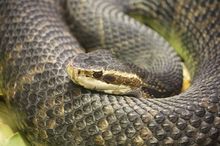In a follow-up to previous research, a group of scientists at the University of South Florida and Auburn have established that, in fact, snakes are a source for the mosquito-borne Eastern equine encephalitis virus that kills horses and humans.

Snake as source of EEE virus
Scientists at the University of South Florida and Auburn have established that snakes are a source for the mosquito-borne Eastern equine encephalitis virus that kills horses and humans.
© 2012 by Ltshears
Since the mosquito population cannot survive during the cold winter months along the Eastern seaboard, scientists theorized that perhaps snakes could serve as reservoirs for the virus during hibernation and on into springtime when a new population of mosquitoes emerge.
The Eastern equine encephalomyelitis virus is found from Florida to Massachusetts and in parts of Latin America. The virus causing the disease normally circulates only in birds, but when it jumps to mammals, it kills 90 percent of infected horses and about a third of the roughly ten Americans who get it each year.
When scientists examined mosquitoes, it was found that they had ingested snake blood. During their research, garter snakes were infected with the virus and then put into hibernation mode in refrigerators.
The virus survived during hibernation.
Then the scientists ventured out into the Tuskegee National Forest swamp in Alabama, capturing mosquitoes found in beaver dens and drawing blood from poisonous cottonmouth snakes.
They found that virus levels in the snakes peaked in the spring and fall, said Thomas R. Unnasch, lead author of the study, published online by The American Journal of Tropical Medicine and Hygiene.
“Snakes’ immune systems work better when it’s warm,” he said, so they do not clear the virus in cold weather. In spring, when they venture out to warm up, mosquitoes pick up the virus again by biting snakes.
In a bit of trivia, that is also an important fact, the scientists revealed that since mosquitoes cannot pierce through a snake's skin, they bite the eyes of the snake, thereby ingesting the virus.
